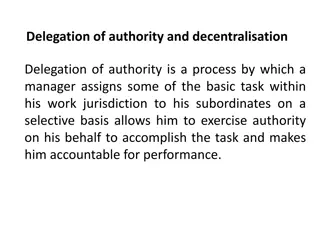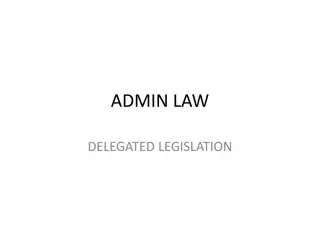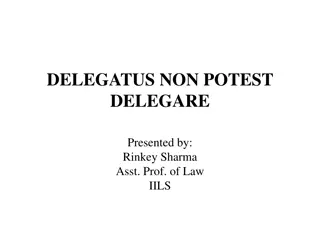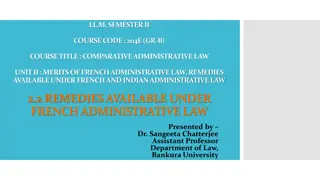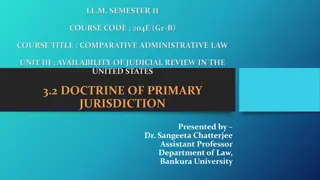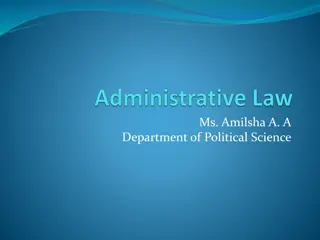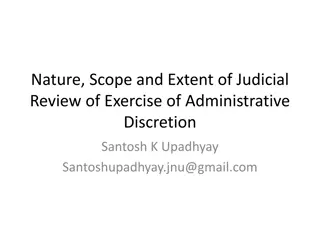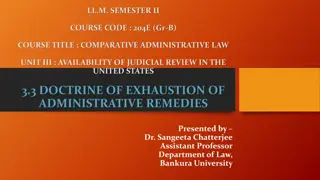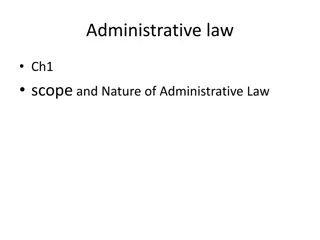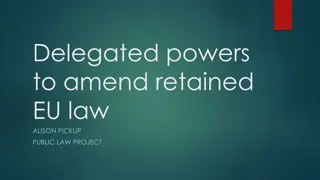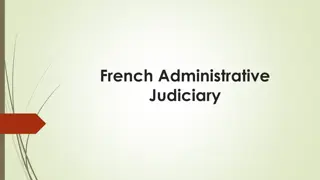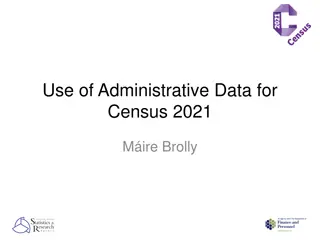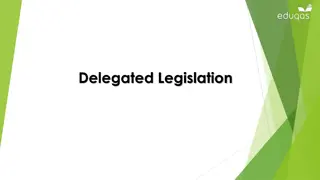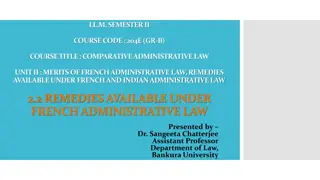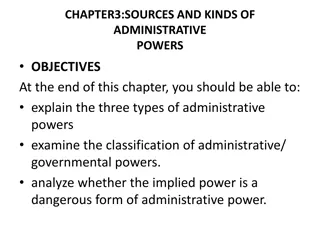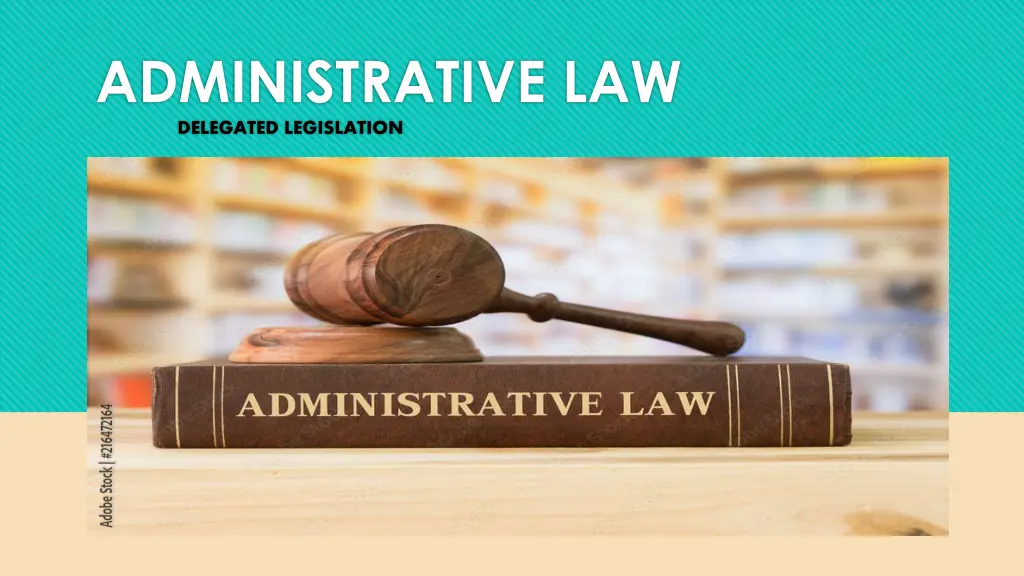
Understanding Delegated Legislation in Administrative Law
Delve into the realm of delegated legislation, also known as secondary or subordinate legislation, which plays a crucial role in modern legal systems. Explore the need for delegated legislation, its significance in the US legal framework, and the concept of delegation under the US Constitution.
Download Presentation

Please find below an Image/Link to download the presentation.
The content on the website is provided AS IS for your information and personal use only. It may not be sold, licensed, or shared on other websites without obtaining consent from the author. If you encounter any issues during the download, it is possible that the publisher has removed the file from their server.
You are allowed to download the files provided on this website for personal or commercial use, subject to the condition that they are used lawfully. All files are the property of their respective owners.
The content on the website is provided AS IS for your information and personal use only. It may not be sold, licensed, or shared on other websites without obtaining consent from the author.
E N D
Presentation Transcript
ADMINISTRATIVE LAW DELEGATED LEGISLATION
INTRODUCTION TO THE TOPIC The delegated legislation is also known as Secondary or Subordinate Legislation; these refers to the bulk of legislation is promulgated by the Executive as a delegate of the Legislature. From the definition of Salmond, the expression delegated legislation, as that which proceeds from nay authority other than Sovereign power and is therefore dependent for its continued existence and validity on some superior or supreme authority . Black's Law Dictionary as a demonstration of entrusting an individual with the force or engaging him to follow up for that individual who has given him that force or to go about as his representative or agent. 'Assigned enactment' signifies practicing of authoritative force by a specialist who is lower in rank to the Legislature, or who is subordinate to the Legislature.
Need for Delegated Legislation Modern legislatures are often overburdened and cannot address every detailed aspect of complex laws. Delegated legislation allows the executive or specialized bodies to create detailed rules and regulations, freeing Parliament to focus on broader policy issues and principles. Many areas of regulation require specialized technical knowledge that legislators may not possess. Delegated legislation enables subject-matter experts or local authorities to draft rules that are practical and effective for specific sectors or regions. Societal needs and circumstances can change rapidly. Delegated legislation allows for quick amendments, updates, or new regulations without the lengthy process of passing a new Act, making the legal system more responsive and adaptable. Local authorities can use delegated legislation to address unique local circumstances, ensuring that laws are relevant and appropriately tailored to different communities or sectors.
Delegated legislation in USA The supreme law of the land the Constitution of the USA bears different equation. At the outset, it provides that, "All legislative Powers herein granted shall be vested in a Congress of the United States." As far as USA is concern, its constitution clearly states that, "the executive power shall be vested in a President of the United States of America. Moreover the President of the USA has been bound to ensure that he shall take care that laws be faithfully executed. In 1892, the Supreme Court declared in Field v. Clark That Congress cannot delegate legislative power to the President is a principle universally recognized as vital to the integrity and maintenance. In 1989, nearly a century after it the Supreme Court of USA in Mistretta v. United States, upheld the urge and gross necessity of the grant of legislative power to the executive agencies to implement the same in most appropriate and efficient way based on the guidelines for federal criminal offences. This precedent paved way towards more pragmatic and liberal judicial interpretations.
The Sweeping Clause and Delegation Being placed under the first Article of the USA Constitution, The Clause has limited breadth. The sweeping clause permits Congress to enact implementing (or execute) laws only if those laws are "necessary and proper" for effectuating federal powers ." This Sweeping Clause runs as- The Congress shall have Power... To make all Laws which shall be necessary and proper for carrying into Execution the foregoing Powers, and all other Powers vested by this Constitution in the Government of the United States, or in any Department or Officer thereof.
Current Scenario Two Power was framers political The delegation found. subsistence of the delegated legislation. phenomena and itself of theories firm operate the potest can Constitution by to the power are in USA delegare". delegate were Locke question, its theories namely Separation Since its imbued and whether polity is exists of "Delegatus delegate, the propagated answer pertaining of legislative USA non how Congress a it power? with Montesquieu. USA yet to about The the American John bears under two be the In there
Nullification Prof. Davis ascertained that; the non-delegation doctrine evolved by the Court is verbiage. The law also allows the delegation even though the policy involves major question of law. He also warned that, any other view apart from this, would make the administration of the modern Governments would be impossible without the delegation of powers. The harshly stricter non-delegation language and the pro-delegation favoured precedents have made the status of delegated legislation quite trembling under USA. However, the stand taken by the Prof. Davis in the appreciation of the delegated legislation requires much more facets ahead. The degree of such delegation has to be regulated and quantified. Therefore, the idea of limited validity has been emerged out in USA. Thus, a transition phase has been started pertaining the concretization of the delegated legislation in in US legal system.
Rule- Making Procedure The enactment of the Administrative Procedure Act (APA) in event in the history of American administrative law. This statute struck a compromise between advocates and opponents of procedural formality, one which has proved resilient and enduring. The APA grew out of a study in 1941 by the Attorney-General's Committee on Administrative Procedure (in much the same way that the Tribunals and Inquiries Act 1958 was inspired by the report of the Franks Committee). Building upon existing practices, the Attorney-General's Committee recommended an informal but mandatory rulemaking system which ultimately became 1946 was the landmark Section 4 of the APA. More specifically, the APA requires an agency to give general notice of the terms or substance of a proposed rule. Interested persons are invited to submit written data, views, or arguments, with or without an oral presentation.
Continued.. Though, in theory, strict adherence thereto was not practicable. Governmental functions had increased and it was impossible for the Congress to enact all the statutes with all particulars. The Supreme Court could not shut its eyes to this reality and tried to create 'a balance between the two conflicting forces: (i) doctrine of separation of powers barring delegation and (ii) inevitability of delegation due to the exigencies of the modern Government.' In Panama Refining Co. v. Ryan, popularly known as the Hot Oil case, under Section 9(c ) of the National Industrial Recovery Act (NIRA), 1933, the President was authorized by the Congress to prohibit transportation of oil in inter-State commerce in excess of the quota fixed by the State concerned. The policy of the Act was 'to encourage national industrial recovery' and 'to foster fair competition'. The Supreme Court by majority held that the delegation was invalid. According to the Court the Congress had not declared any legislative policy or standards.
Delegated legislation in UK The United Kingdom, as the cradle of parliamentary democracy, has a unique system of delegated legislation rooted in the principle of parliamentary sovereignty, where Parliament holds supreme authority. Historically, the power to legislate by proclamation was initially vested in the Crown, notably through Henry VIII s Statute of Proclamations in 1539, which allowed royal proclamations to have the force of law. Although this statute was repealed in 1547, subsequent Acts of Parliament continued to delegate legislative powers to the Crown and, later, to various administrative bodies. The legal doctrine of the King in Parliament ensures there is no constitutional barrier to delegating legislative or judicial powers to the executive. Over time, especially during periods of rapid social and economic change such as the sixteenth and nineteenth centuries, Parliament increasingly delegated broad powers to the executive and administrative authorities to manage the expanding functions of government. Today, subordinate legislation has grown in both volume and complexity, often surpassing the output of primary legislation. This longstanding practice highlights the essential role of delegated legislation in the UK s legal and governmental framework.
Delegation of Power to Executive The UK Emergency Powers Act 1920 provides the executive with permanent authority to legislate during certain emergencies, subject to parliamentary safeguards. Legislative powers can be delegated to the executive mainly in two ways: either His Majesty is empowered to issue Orders in Council for specific purposes, or authority is granted to a designated Minister to create regulations, rules, schemes, or orders. Since the Statutory Instruments Act 1946, such Orders in Council and many departmental regulations are classified as "statutory instruments" and are subject to defined parliamentary procedures. Orders in Council, made at formal Privy Council meetings, often address significant legislative matters, such as setting the commencement date for statutes or legislating for colonies and dependencies. Other bodies with delegated legislative powers include independent statutory authorities (like the Milk Marketing Board), local authorities (which make by-laws), and professional bodies (such as the Council of the Law Society, which regulates legal training requirements). This framework allows the executive and various authorities to efficiently address detailed and technical aspects of governance while maintaining parliamentary oversight.
The government now possesses broad regulatory powers to ensure that the nations resources are used effectively for the community s benefit. Major statutes like the National Insurance Act 1946 and the Town and Country Planning Act 1947, often called "Skeleton Acts," delegate significant authority to ministers to create detailed regulations. The volume of delegated legislation has grown dramatically, with statutory rules and orders increasing from 1,231 in 1937 to 2,916 in 1947, reflecting only a fraction of the total. This proliferation of technical regulations has led to concerns about diminished public respect for the law, as citizens struggle to keep up with complex rules. Critics like Professor F. A. Hayek and Dr. C. K. Allen argue that as long as collectivist policies prevail, the volume of delegated legislation is unlikely to decrease, and a return to laissez-faire governance is unrealistic in today s economic and political climate.
Restraints on Delegation of Legislative Power in U.K In the UK, delegated legislation is subject to important restraints to ensure its validity and conformity with higher legal standards. A statutory instrument can be challenged if its content exceeds the authority granted by the parent Act (ultra vires) or if the correct procedures were not followed in its creation. The Human Rights Act 1998 further requires that all legislation, including delegated legislation, be interpreted consistently with European Convention rights. Unlike Acts of Parliament, delegated legislation does not enjoy immunity from judicial challenge and can be reviewed by courts to ensure it does not exceed the powers granted by Parliament. Parliamentary control is exercised through the limits set in the enabling Act, specifying who may legislate and the extent of their powers, and through procedures like the work of the Scrutiny Committee, which reviews statutory instruments. However, the sheer volume of delegated legislation limits the effectiveness of parliamentary oversight. Judicial review provides another layer of control, allowing the courts to declare delegated legislation void if it is found to be ultra vires, but courts do not assess the merits of the legislation, only its legality. Thus, while Parliament remains supreme, both parliamentary and judicial controls act as safeguards against the misuse of delegated legislative power.
DELEGATED LEGISLATION IN INDIA Delegated legislation in India refers to laws, rules, regulations, by-laws, and orders made by authorities other than the legislature, under powers conferred by an enabling Act passed by Parliament or a state legislature. This mechanism allows the executive and other bodies to create detailed legal provisions necessary for effective governance, especially in complex or technical areas where the legislature may lack the time or expertise to legislate directly. Although the Indian Constitution does not explicitly mention "delegated legislation," it recognizes and permits the practice through various provisions. Parliament and state legislatures can delegate their law-making powers to the executive or other authorities, provided essential legislative functions-such as setting policy-are not abdicated. The framework for delegated legislation evolved post-independence, with the Constitution of India empowering legislatures to delegate, subject to judicial and parliamentary safeguards.
Control and Safeguards Parliamentary Control: The legislature retains oversight through requirements such as the "laying" of rules before Parliament, which may be subject to negative or affirmative resolution procedures. Committees like the Committee on Subordinate Legislation scrutinize delegated legislation for conformity with the parent Act and constitutional principles.
Continued.. Judicial Control: Courts can review delegated legislation to ensure it does not exceed the powers granted by the enabling Act (ultra vires) or violate constitutional provisions, especially fundamental rights under Articles 14 and 19. Judicial review is a basic feature of the Constitution, and courts have struck down delegated legislation found to be unreasonable, arbitrary, or beyond the scope of the enabling Act.
Case laws The cases of Queen v. Burah and King v. Banwari Lal Sharma were pivotal in the early recognition of delegated legislation in India, particularly for administrative efficiency. In Queen v. Burah, the Privy Council upheld the validity of conditional legislation, allowing the legislature to confer certain powers on the executive, such as bringing an Act into force or extending its provisions to specific territories, provided certain conditions were met. This was not seen as an abdication of essential legislative functions, but rather as a practical mechanism to address administrative needs. Similarly, in King v. Banwari Lal Sharma, the Privy Council affirmed the Governor-General s authority to establish special courts under an Emergency Ordinance, recognizing this as a legitimate exercise of conditional legislative power by the local administrative body when necessary for effective governance. These cases established that while essential legislative functions and policy determination must remain with the legislature, certain conditional or ancillary powers could be delegated to the executive for efficient administration.
The Delhi Laws Act Case (In re: Delhi Laws Act, 1912) This is a landmark Supreme Court judgment that defined the constitutional limits of delegated legislation in India. The case addressed whether the delegation of legislative powers to the executive under the Delhi Laws Act, 1912, Ajmer-Merwara Act, 1947, and Part C States (Laws) Act, 1950, was constitutional. These Acts allowed the government to extend, modify, or repeal laws in certain territories, raising concerns about excessive delegation and violation of the separation of powers. The Supreme Court upheld the validity of these Acts but clearly ruled that while the legislature may delegate ancillary or administrative functions to the executive for effective governance, it cannot delegate its essential legislative functions, such as formulating policy or enacting binding rules of conduct. The Court emphasized that Parliament must not abdicate its legislative responsibility or create a parallel law-making authority and must provide adequate guidelines to control the exercise of delegated powers. This judgment legitimized the necessity of delegated legislation in a modern, complex society, but firmly established that the legislature must retain ultimate control and cannot delegate its core law-making powers, ensuring that all delegation remains within constitutional boundaries.
Avinder Singh v. State of Punjab (1979) 1 SCR 845 The Supreme Court in Avinder Singh v. State of Punjab (1979), delegating taxation powers to municipal corporations under Section 90 of the Punjab Municipal Corporation Act. The case arose when the Punjab government directed municipal bodies to impose a tax on the sale of foreign liquor, and upon their failure, the State itself imposed the tax. Petitioners challenged this as excessive delegation lacking legislative guidance. The Court reaffirmed that while the legislature cannot delegate its essential legislative functions-such as formulating policy and enacting binding implementation. The Court found the delegation valid in this instance because the Act clearly specified the items to be taxed, the purposes for which taxes could be levied, and imposed limits, thus providing sufficient guidance and preventing arbitrary exercise of power. The judgment emphasized that courts must strike down any law conferring unguided or arbitrary power, as it would violate constitutional principles under Articles 14 and 19. Ultimately, the Court upheld the delegation, clarifying that while taxing power is traditionally legislative, it may be delegated to local bodies if accompanied by clear policy guidelines and limits, as was the case here, making it a textbook example of permissible delegation. addressed the validity of rules-it can delegate details necessary for
D.S. Nakara v. Union of India (1983) 1 SCC 305 In D.S. Nakara v. Union of India, the Supreme Court examined the reasonableness of a rule created through delegated legislation, specifically focusing on whether a classification among pensioners based on the date of retirement was constitutionally valid. The Central Civil Services (Pension) Rules, 1972, as amended, provided for a liberalized pension scheme but restricted its benefit only to those who retired after a specified date, thereby excluding those who retired earlier, even though all pensioners had performed similar work and belonged to the same class. The Court held that reasonableness is an essential requirement for the validity of delegated legislation, especially when tested against Article 14 of the Constitution, which guarantees equality before the law. The Supreme Court ruled that any classification must satisfy the twin tests: it must be based on an intelligible differentia and have a rational nexus to the object sought to be achieved by the legislation. In this case, the Court found the classification based on the date of retirement to be manifestly arbitrary and unreasonable, as it created discrimination among equals without any justifiable basis. The rule was thus struck down as violative of Article 14.
The judgment in D.S. Nakara established that delegated legislation, like administrative rules, must not be arbitrary, discriminatory, or oppressive; it must be reasonable and in conformity with constitutional mandates, particularly equality and non-arbitrariness. The Court reinforced that the test of reasonableness applies to all forms of delegated legislation, and any rule failing this test is liable to be declared unconstitutional.
Kerala Samsthana Chethu Thozhilali Union v. State of Kerala (2006) 4 SCC 327 The Supreme Court s decision in Kerala Samsthana Chethu Thozhilali Union v. State of Kerala (2006) 4 SCC 327 is a landmark judgment that clarified the limits of delegated legislation under the Kerala Abkari Act, 1901. The dispute arose when Rules 4(2) and 9(10)(b) of the Kerala Abkari Shops Disposal Rules, 2002, required toddy shop licensees to employ retrenched arrack workers. The appellants challenged these rules as ultra vires the parent Act. The key issues were whether the State could impose such employment conditions through delegated legislation and whether these rules exceeded the scope of the Kerala Abkari Act. The Supreme Court struck down the rules, holding that the Act did not authorize the State to regulate employment terms in licensed shops, as such matters are governed by the Industrial Disputes Act, 1947, a central law. The Court emphasized that the State s power under Section 29(1) of the Abkari Act-to make rules for "carrying out the purposes of the Act"-could not be used to legislate on employment conditions, which are unrelated to the regulation of the liquor trade. The rules were deemed an encroachment on the legislative domain, as they attempted to legislate on labor welfare, a subject outside the delegated authority of the Act. The judiciary reaffirmed that the executive cannot use delegated legislation to bypass the legislature s essential functions, such as determining labor rights. The Court cited precedents, reiterating that delegated legislation must operate within the framework and objectives of the parent statute, and noted that while the State s intent to rehabilitate workers was commendable, it required explicit legislative authorization. As a result, the rules were invalidated, and compensation was provided to affected workers. The judgment reinforced the principle that delegated legislation must have a clear nexus with the enabling Act s objectives and cannot override the legislature s constitutional mandate.
Dwarka Prasad Laxmi Narain v. State of Uttar Pradesh (AIR 1954 SC 224) This is a landmark Supreme Court case that established important principles regarding judicial control over delegated legislation and the limits of administrative discretion in India. The case arose when coal traders in Kanpur challenged the U.P. Coal Control Order, 1953, issued under the Essential Supplies (Temporary Powers) Act, 1946. The Order imposed strict controls on the sale and pricing of coal, including licensing requirements and price fixation, which the petitioners argued made it impossible to carry on their business, thereby violating their fundamental rights under Article 19(1)(g) (freedom to practice any profession or to carry on any occupation, trade or business) and Article 14 (right to equality) of the Constitution
Continue .. The Supreme Court upheld the State s competence to regulate the coal trade in the public interest and recognized the necessity of delegated legislation in complex economic matters. However, it struck down Clause 4(3) of the U.P. Coal Control Order as ultra vires and void because it conferred arbitrary and unguided power on the executive to grant, refuse, or revoke licenses without any procedural safeguards or guidelines, resulting in an unreasonable restriction on the right to carry on business and violating Article 19(1)(g). The Court emphasized that while the legislature can delegate powers to the executive, it must lay down clear policies, principles, or guidelines to prevent abuse of power, and any restriction on fundamental rights must be reasonable and in the public interest as required by Article 19(6). This case is significant because it affirmed that courts can review and strike down delegated legislation that grants excessive or arbitrary powers to the executive, and that the legislature must provide sufficient guidance and safeguards when delegating authority. Ultimately, the judgment reinforced that delegated legislation must operate within constitutional limits, with adequate safeguards to prevent arbitrary executive action and protect citizens fundamental rights.
What is an essential legislative function An essential legislative function refers to the core responsibilities of a legislature that cannot be transferred to other authorities. In India, this concept is critical in understanding the limits of delegated legislation (subordinate rules made by the executive under a parent Act). The legislature alone must define the policy, objectives, and standards of a law. For example, if Parliament enacts a law on environmental protection, it must outline the broad goals (e.g., reducing pollution) and principles (e.g., "polluter pays" doctrine). Delegating this policy-making power is unconstitutional. Only the legislature can formally convert policy into binding rules of conduct. This includes defining rights, duties, and penalties. For instance, setting the maximum punishment for a crime is an essential function that cannot be delegated. Granting laws retrospective effect is an essential function, as it impacts vested rights. This power cannot be delegated.
Conditional Legislation Conditional legislation refers to laws enacted by the legislature that are fully formed and complete in their policy and framework, but whose operation, enforcement, or application is made dependent on the fulfillment of certain specified conditions or the occurrence of particular events. In this arrangement, the legislature does not delegate its law-making power; instead, it specifies that the law will only come into effect when certain prerequisites are met. The authority given to another body (often the executive) is limited to determining whether those conditions have been fulfilled and, if so, bringing the law into operation.
Key Features of Conditional Legislation No Delegation of Legislative Power: The legislature retains its law-making authority and does not transfer the power to make rules or regulations to another body. Contingent Operation: The law s enforcement or application is contingent upon the occurrence of specified conditions or events, such as the readiness of infrastructure or the happening of a particular situation. Policy Determination by Legislature: All essential legislative functions, including policy and principles, are determined by the legislature itself. Role of Delegate: The delegate (usually the executive) only verifies or certifies the fulfillment of the conditions and brings the law into effect; it does not have the authority to alter, amend, or supplement the law. Flexibility: Conditional legislation provides flexibility in governance by allowing laws to be enforced only when appropriate circumstances arise, thus preventing premature or unnecessary application.
Hamdard Dawakhana v. Union of India In Hamdard Dawakhana (Wakf) Lal Kuan, Delhi and Another v. Union of India and Others, the Supreme Court of India clarified the distinction between conditional legislation and delegated legislation, emphasizing that conditional legislation does not involve the delegation of legislative power. In conditional legislation, the legislature enacts a complete law but makes its enforcement or application dependent on the fulfillment of certain conditions or the occurrence of specified events, leaving it to the executive or another authority merely to determine when or where the law should come into effect. The delegate s role is thus limited to ascertaining the existence of those conditions and bringing the law into operation, rather than making, altering, or supplementing the law itself. The Court highlighted that this approach allows the government to address practical difficulties in implementation and provides flexibility, but it does not transfer the essential legislative function of formulating policy or rules of conduct. This principle, as reaffirmed in the Delhi Laws Act case, ensures that the legislature maintains ultimate control over law-making while enabling practical administration by the executive within clearly defined boundaries.
Judicial control Doctrine of ultra Vires Judicial control is a crucial mechanism to ensure that delegated legislation remains within the legal and constitutional boundaries set by the parent (enabling) Act and the Constitution. Indian courts, particularly the Supreme Court and High Courts, exercise this control primarily through the process of judicial review. This allows the judiciary to examine whether delegated legislation exceeds the powers granted by the legislature or violates constitutional provisions, especially fundamental rights. Judicial review of delegated legislation can be invoked on two main grounds: Substantive Ultra Vires: When the content or substance of the delegated legislation goes beyond the scope of authority granted by the parent Act or violates constitutional provisions. For example, if a rule imposes unreasonable restrictions or grants arbitrary powers to the executive, it may be struck down as ultra vires, as seen in Dwarka Prasad v. State of U.P. Procedural Ultra Vires: When the delegated legislation is made without following the mandatory procedures prescribed by the enabling Act. This includes failures such as not publishing the rules as required, not consulting relevant stakeholders, or not laying the rules before Parliament as mandated.
Parliamentary or legislative control Parliamentary control over delegated legislation in India is fundamentally exercised through the laying procedure, which serves as a vital mechanism to ensure transparency, accountability, and adherence to legislative intent. Laying refers to the formal process by which rules, regulations, or by-laws made by the executive or other delegated authorities are placed before Parliament for scrutiny, either before they come into force or while they are in operation. This process allows Parliament to be informed about the scope and content of subordinate legislation and provides an opportunity to examine, discuss, modify, or annul such legislation if it exceeds the powers granted by the parent Act or is otherwise inappropriate. There are three principal forms of laying in India: simple laying, where the rules are merely placed before Parliament for a specified period and remain valid unless specifically annulled; negative laying, where the rules come into effect immediately but may be annulled by Parliament within a certain timeframe; and affirmative laying, where the delegated legislation does not come into force until expressly approved by Parliament.
Direct control and indirect control Direct and indirect parliamentary control over delegated legislation differ mainly in their approach and mechanisms. Direct control involves the immediate and active participation of Parliament, primarily through the laying procedure, where rules and regulations made by the executive are formally placed before Parliament for scrutiny. This enables members to debate, question, and, if necessary, annul or modify the delegated legislation through resolutions and discussions, ensuring that the rules do not exceed the authority granted by the parent Act. Direct control also occurs at the stage of passing the enabling Act, where Parliament debates the necessity and extent of delegation. In contrast, indirect control is exercised through specialized parliamentary committees, such as the Committee on Subordinate Legislation in both Houses. These committees conduct systematic and detailed reviews of delegated legislation to ensure conformity with the objectives of the parent Act, check for overreach, and assess issues like retrospective effect, imposition of taxes, or encroachment on judicial jurisdiction. The committees report their findings and recommendations to the House, which may then take appropriate action, such as amendment or annulment of the rules. Thus, while direct control is characterized by immediate oversight and intervention, indirect control relies on continuous, in-depth examination by parliamentary committees, together forming a comprehensive framework to prevent executive overreach and uphold legislative supremacy.
Procedural and Executive Control in Delegated Legislation Procedural Control Procedural control refers to the formal processes and safeguards established to ensure that delegated legislation is created in a transparent, fair, and accountable manner. These controls are designed to provide checks at various stages of the rule-making process and typically include Prior Consultation: Before making rules, the executive may be required to consult with stakeholders or those likely to be affected by the proposed legislation. This helps incorporate feedback and ensures the rules are practical and just. Publication: Rules and regulations made under delegated authority are often required to be published in the official gazette. This ensures public awareness and allows affected parties to understand and comply with the law. Laying Procedure: After rules are made, they are laid before Parliament for scrutiny. This allows Parliament to review, amend, or annul the rules if necessary, ensuring legislative oversight. Memorandum on Delegation: At the central level, any bill proposing delegation of legislative power must be accompanied by a memorandum explaining the scope and necessity of such delegation, drawing the attention of Parliament to its character. Scrutiny Committees: Legislative scrutiny committees review the delegated legislation to ensure it aligns with the objectives of the parent Act and does not exceed the powers conferred. 1. 2. 3. 4. 5.
Executive (Administrative) Control Executive or administrative control refers to the internal checks and procedures within the executive branch itself to ensure that delegated legislation is made properly and in accordance with legislative intent. Key aspects include: 1. Internal Review and Supervision: The executive may establish internal guidelines, require approvals from higher authorities, or conduct reviews to ensure rules are consistent with government policy and legal standards. 2. Consultation with Experts: The executive often consults technical experts, legal advisors, or specialized agencies to draft effective and technically sound regulations. 3. Adherence to Procedures: The executive must follow the procedures laid down in the parent Act or administrative guidelines, such as timelines for drafting, approval, and publication of rules. 4. Self-Correction: If errors or issues are identified, the executive can amend or withdraw the delegated legislation to address concerns, thus maintaining flexibility and responsiveness. 5. While executive control is primarily internal and self-regulatory, it plays a crucial role in ensuring that the process of making delegated legislation is efficient, legally sound, and aligned with the broader objectives set by the legislature.
Delegated Legislation through Constitutional Provision Articles 301 to 307 of the Indian Constitution, under Part XIII, deal with the freedom of trade, commerce, and intercourse within the territory of India, along with the scope and limits of this freedom and the mechanisms to enforce it. Article 301 guarantees the general freedom of trade, commerce, and intercourse throughout India, ensuring that goods, services, and people can move freely across state boundaries without undue restrictions. Article 302 empowers Parliament to impose restrictions on this freedom in the public interest, allowing it to regulate trade and commerce between states or within any part of India when necessary for reasons such as security, public order, or morality. Article 303 prohibits both Parliament and state legislatures from enacting laws that give preference to or discriminate against one state over another concerning trade and commerce, except when such discrimination is necessary to address scarcity of goods in any part of India.
Continued.. Article 304 allows state legislatures to impose reasonable restrictions on trade and commerce within their territory, subject to prior approval by the President (Article 304(b)). Unlike Parliament, states can make laws that may incidentally affect inter-state trade, but these must be reasonable and receive presidential sanction. Article 305 protects existing laws and laws providing for state monopolies from being invalidated by the provisions of Articles 301 and 303. This means laws enacted before the Constitution or under specific entries in the legislative lists remain valid despite the freedom guaranteed under Article 301. Article 306 was omitted by the Constitution (Seventh Amendment) Act, 1956, and is no longer in effect. Article 307 authorizes Parliament to appoint an authority to carry out the purposes of Articles 301 to 304. This authority can be vested with such powers and duties as Parliament deems necessary to ensure the smooth enforcement of the freedom of trade and commerce across India. Together, these articles establish a constitutional framework balancing the freedom of trade and commerce with the need for reasonable regulation in the public interest, while preventing discrimination between states. The provision for appointing an authority under Article 307 reflects delegated legislation in this context, where Parliament can empower bodies to implement and supervise trade and commerce policies effectively.
Appointment of scrutiny committee Appointment and Composition In India, the appointment of scrutiny committees plays a crucial role in ensuring effective parliamentary control over delegated legislation. The primary bodies responsible for this function are the Committee on Subordinate Legislation in both the Lok Sabha and the Rajya Sabha. The Committee on Subordinate Legislation in the Lok Sabha was first constituted in December 1953 and has been reconstituted annually since then. Its functioning is governed by Rules 317 322 of the Rules of Procedure and Conduct of Business in Lok Sabha and relevant Directions by the Speaker. The Rajya Sabha Committee on Subordinate Legislation was constituted in 1964 and operates under Rules 204 206 of the Rules of Procedure and Conduct of Business in Rajya Sabha. Members of these committees are nominated by the Speaker (Lok Sabha) or the Chairman (Rajya Sabha), and the committees typically consist of 15 members, including a chairperson.
Functions of the Scrutiny Committee These committees are tasked with examining whether the executive s rule-making powers, conferred by the Constitution or delegated by Parliament, are being exercised properly and within the limits of such delegation. They scrutinize all forms of delegated legislation-rules, regulations, by-laws, schemes, and statutory instruments-regardless of whether they are laid before the House. The committees assess if the delegated legislation: Is in accordance with the general objects of the parent Act, Contains matters that should more properly be dealt with in the Act itself, Is retrospective without authority, Bars judicial review, Imposes unauthorized financial levies or taxes, Is discriminatory or exceeds the rule- making power conferred by the parent Act.
Conclusion The appointment of scrutiny committees, particularly the Committee on Subordinate Legislation in both the Lok Sabha and Rajya Sabha, is a fundamental aspect of parliamentary oversight over delegated legislation in India. These committees are composed of nominated members and are tasked with examining whether the executive s rule-making powers are exercised within the limits set by the parent Act and the Constitution. Their functions include reviewing all forms of delegated legislation to ensure they are not arbitrary, retrospective without authority, discriminatory, or beyond the scope of the enabling statute. By providing detailed and ongoing scrutiny, these committees act as an effective safeguard against executive overreach, ensuring that delegated legislation aligns with legislative intent and protects citizens rights. In conclusion, scrutiny committees play a vital role in maintaining the balance between legislative oversight and executive action, accountability, transparency, and constitutional governance in the Indian legal system. thereby upholding the principles of

